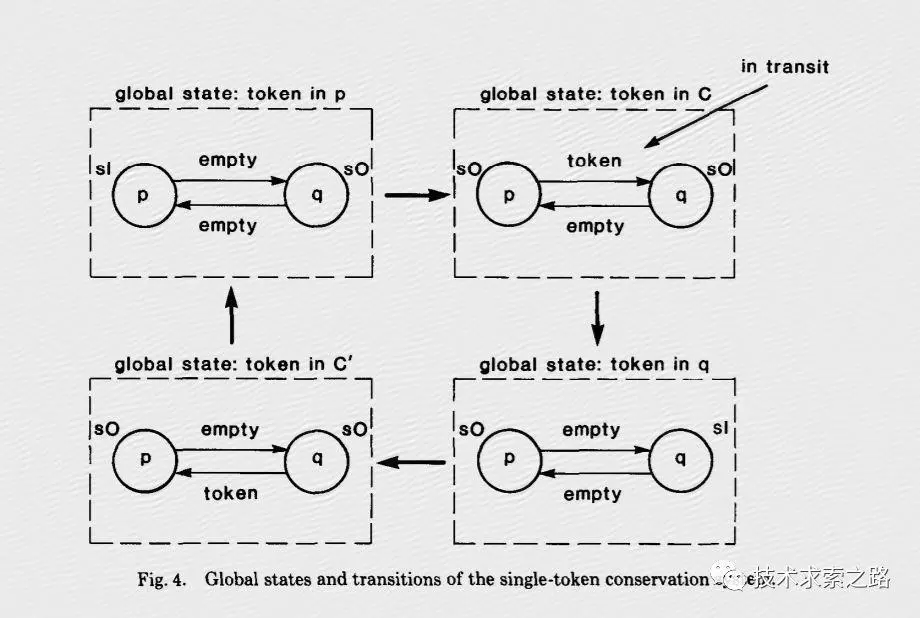Flink学习(三)状态机制于容错机制,State与CheckPoint
摘自Apache官网
一、State的基本概念
什么叫State?搜了一把叫做状态机制。可以用作以下用途。为了保证 at least once, exactly once,Flink引入了State和Checkpoint
- 某个task/operator某时刻的中间结果
- 快照(snapshot)
- 程序一旦crash,恢复用的
- 机器学习模型的参数
二、Flink中包含的State
Keyed State和Opreator State
1、Keyed State基于KeyedStream的状态。这个状态是跟特定的key绑定的。对KeyedStream流上的每一个key,可能都对应一个state。
2、Operator State。于Keyed State不同。Operator State根一个特定的Operator绑定。整个Operator对应一个State。相比较而言一个State上有多个Keyed State。举例子来说,在Flink中的Kafka Connector就使用了Operator State。会在每个connector实例中,保存该实例中消费topic的所有(partition, offset)映射。
一些原子State
-
ValueState:即类型为T的单值状态。这个状态与对应的key绑定,是最简单的状态了。它可以通过update方法更新状态值,通过value()方法获取状态值。
-
ListState:即key上的状态值为一个列表。可以通过add方法往列表中附加值;也可以通过get()方法返回一个Iterable<T>来遍历状态值。
-
ReducingState:这种状态通过用户传入的reduceFunction,每次调用add方法添加值的时候,会调用reduceFunction,最后合并到一个单一的状态值。
-
MapState:即状态值为一个map。用户通过put或putAll方法添加元素。
上述的State仅仅与状态进行交互。而真正的状态值,有可能是存在内存,磁盘、或者其它分布式系统中。相当于只是我们持有了这个句柄。那么我们如何得到这个状态的句柄呢?Flink通过StateDescriptor来定义一个状态。这是一个抽象类,内部定义了状态名称、类型、序列化器等基础信息。与上面的状态对应、从StateDescriptor派生了ValueStateDescriptor,ListStateDescriptor等descriptor。
3、研究下Keyed State内部的结构
在StreamingRuntimeContext这个类中可以看到各个State的get方法
/* * Licensed to the Apache Software Foundation (ASF) under one * or more contributor license agreements. See the NOTICE file * distributed with this work for additional information * regarding copyright ownership. The ASF licenses this file * to you under the Apache License, Version 2.0 (the * "License"); you may not use this file except in compliance * with the License. You may obtain a copy of the License at * * http://www.apache.org/licenses/LICENSE-2.0 * * Unless required by applicable law or agreed to in writing, software * distributed under the License is distributed on an "AS IS" BASIS, * WITHOUT WARRANTIES OR CONDITIONS OF ANY KIND, either express or implied. * See the License for the specific language governing permissions and * limitations under the License. */ package org.apache.flink.streaming.api.operators; import org.apache.flink.annotation.PublicEvolving; import org.apache.flink.api.common.accumulators.Accumulator; import org.apache.flink.api.common.functions.BroadcastVariableInitializer; import org.apache.flink.api.common.functions.util.AbstractRuntimeUDFContext; import org.apache.flink.api.common.state.AggregatingState; import org.apache.flink.api.common.state.AggregatingStateDescriptor; import org.apache.flink.api.common.state.FoldingState; import org.apache.flink.api.common.state.FoldingStateDescriptor; import org.apache.flink.api.common.state.KeyedStateStore; import org.apache.flink.api.common.state.ListState; import org.apache.flink.api.common.state.ListStateDescriptor; import org.apache.flink.api.common.state.MapState; import org.apache.flink.api.common.state.MapStateDescriptor; import org.apache.flink.api.common.state.ReducingState; import org.apache.flink.api.common.state.ReducingStateDescriptor; import org.apache.flink.api.common.state.StateDescriptor; import org.apache.flink.api.common.state.ValueState; import org.apache.flink.api.common.state.ValueStateDescriptor; import org.apache.flink.runtime.execution.Environment; import org.apache.flink.runtime.jobgraph.tasks.InputSplitProvider; import org.apache.flink.streaming.api.CheckpointingMode; import org.apache.flink.streaming.api.graph.StreamConfig; import org.apache.flink.streaming.runtime.tasks.ProcessingTimeService; import org.apache.flink.util.Preconditions; import java.util.List; import java.util.Map; /** * Implementation of the {@link org.apache.flink.api.common.functions.RuntimeContext}, * for streaming operators. */ @PublicEvolving public class StreamingRuntimeContext extends AbstractRuntimeUDFContext { /** The operator to which this function belongs. */ private final AbstractStreamOperator<?> operator; /** The task environment running the operator. */ private final Environment taskEnvironment; private final StreamConfig streamConfig; public StreamingRuntimeContext(AbstractStreamOperator<?> operator, Environment env, Map<String, Accumulator<?, ?>> accumulators) { super(env.getTaskInfo(), env.getUserClassLoader(), operator.getExecutionConfig(), accumulators, env.getDistributedCacheEntries(), operator.getMetricGroup()); this.operator = operator; this.taskEnvironment = env; this.streamConfig = new StreamConfig(env.getTaskConfiguration()); } // ------------------------------------------------------------------------ /** * Returns the input split provider associated with the operator. * * @return The input split provider. */ public InputSplitProvider getInputSplitProvider() { return taskEnvironment.getInputSplitProvider(); } public ProcessingTimeService getProcessingTimeService() { return operator.getProcessingTimeService(); } // ------------------------------------------------------------------------ // broadcast variables // ------------------------------------------------------------------------ @Override public boolean hasBroadcastVariable(String name) { throw new UnsupportedOperationException("Broadcast variables can only be used in DataSet programs"); } @Override public <RT> List<RT> getBroadcastVariable(String name) { throw new UnsupportedOperationException("Broadcast variables can only be used in DataSet programs"); } @Override public <T, C> C getBroadcastVariableWithInitializer(String name, BroadcastVariableInitializer<T, C> initializer) { throw new UnsupportedOperationException("Broadcast variables can only be used in DataSet programs"); } // ------------------------------------------------------------------------ // key/value state // ------------------------------------------------------------------------ @Override public <T> ValueState<T> getState(ValueStateDescriptor<T> stateProperties) { KeyedStateStore keyedStateStore = checkPreconditionsAndGetKeyedStateStore(stateProperties); stateProperties.initializeSerializerUnlessSet(getExecutionConfig()); return keyedStateStore.getState(stateProperties); } @Override public <T> ListState<T> getListState(ListStateDescriptor<T> stateProperties) { KeyedStateStore keyedStateStore = checkPreconditionsAndGetKeyedStateStore(stateProperties); stateProperties.initializeSerializerUnlessSet(getExecutionConfig()); return keyedStateStore.getListState(stateProperties); } @Override public <T> ReducingState<T> getReducingState(ReducingStateDescriptor<T> stateProperties) { KeyedStateStore keyedStateStore = checkPreconditionsAndGetKeyedStateStore(stateProperties); stateProperties.initializeSerializerUnlessSet(getExecutionConfig()); return keyedStateStore.getReducingState(stateProperties); } @Override public <IN, ACC, OUT> AggregatingState<IN, OUT> getAggregatingState(AggregatingStateDescriptor<IN, ACC, OUT> stateProperties) { KeyedStateStore keyedStateStore = checkPreconditionsAndGetKeyedStateStore(stateProperties); stateProperties.initializeSerializerUnlessSet(getExecutionConfig()); return keyedStateStore.getAggregatingState(stateProperties); } @Override public <T, ACC> FoldingState<T, ACC> getFoldingState(FoldingStateDescriptor<T, ACC> stateProperties) { KeyedStateStore keyedStateStore = checkPreconditionsAndGetKeyedStateStore(stateProperties); stateProperties.initializeSerializerUnlessSet(getExecutionConfig()); return keyedStateStore.getFoldingState(stateProperties); } @Override public <UK, UV> MapState<UK, UV> getMapState(MapStateDescriptor<UK, UV> stateProperties) { KeyedStateStore keyedStateStore = checkPreconditionsAndGetKeyedStateStore(stateProperties); stateProperties.initializeSerializerUnlessSet(getExecutionConfig()); return keyedStateStore.getMapState(stateProperties); } private KeyedStateStore checkPreconditionsAndGetKeyedStateStore(StateDescriptor<?, ?> stateDescriptor) { Preconditions.checkNotNull(stateDescriptor, "The state properties must not be null"); KeyedStateStore keyedStateStore = operator.getKeyedStateStore(); Preconditions.checkNotNull(keyedStateStore, "Keyed state can only be used on a 'keyed stream', i.e., after a 'keyBy()' operation."); return keyedStateStore; } // ------------------ expose (read only) relevant information from the stream config -------- // /** * Returns true if checkpointing is enabled for the running job. * * @return true if checkpointing is enabled. */ public boolean isCheckpointingEnabled() { return streamConfig.isCheckpointingEnabled(); } /** * Returns the checkpointing mode. * * @return checkpointing mode */ public CheckpointingMode getCheckpointMode() { return streamConfig.getCheckpointMode(); } /** * Returns the buffer timeout of the job. * * @return buffer timeout (in milliseconds) */ public long getBufferTimeout() { return streamConfig.getBufferTimeout(); } }
所有的State都继承自StateDescpritor这个类。简单看一下构造函数。实际上包含了三个参数,
- 名称
- 类型--属于哪一类state
- 默认值
1 protected StateDescriptor(String name, Class<T> type, T defaultValue) { 2 this.name = requireNonNull(name, "name must not be null"); 3 requireNonNull(type, "type class must not be null"); 4 5 try { 6 this.typeInfo = TypeExtractor.createTypeInfo(type); 7 } catch (Exception e) { 8 throw new RuntimeException( 9 "Could not create the type information for '" + type.getName() + "'. " + 10 "The most common reason is failure to infer the generic type information, due to Java's type erasure. " + 11 "In that case, please pass a 'TypeHint' instead of a class to describe the type. " + 12 "For example, to describe 'Tuple2<String, String>' as a generic type, use " + 13 "'new PravegaDeserializationSchema<>(new TypeHint<Tuple2<String, String>>(){}, serializer);'", e); 14 } 15 16 this.defaultValue = defaultValue; 17 }
再具体的可以自己研究研究,建议工作遇到或者对源码有兴趣可以读读。或者结合实际应用理解下会更快
三、容错机制
1、Flink的核心容错机制是不断的给数据流绘制Snapshots。当系统回滚的时候,这些snapshots就扮演了checkpoints的作用。快照机制受Chandy-Lamport 算法的启发。
读了下论文研究了下这个算法。英文的看不太懂。找了个中文的。

大概就是通过token 和marker来判断是哪里出了问题和需要恢复。
具体可以参考:
https://www.jianshu.com/p/938001e998f5




【推荐】国内首个AI IDE,深度理解中文开发场景,立即下载体验Trae
【推荐】编程新体验,更懂你的AI,立即体验豆包MarsCode编程助手
【推荐】抖音旗下AI助手豆包,你的智能百科全书,全免费不限次数
【推荐】轻量又高性能的 SSH 工具 IShell:AI 加持,快人一步
· AI与.NET技术实操系列:向量存储与相似性搜索在 .NET 中的实现
· 基于Microsoft.Extensions.AI核心库实现RAG应用
· Linux系列:如何用heaptrack跟踪.NET程序的非托管内存泄露
· 开发者必知的日志记录最佳实践
· SQL Server 2025 AI相关能力初探
· 震惊!C++程序真的从main开始吗?99%的程序员都答错了
· 【硬核科普】Trae如何「偷看」你的代码?零基础破解AI编程运行原理
· 单元测试从入门到精通
· winform 绘制太阳,地球,月球 运作规律
· 上周热点回顾(3.3-3.9)